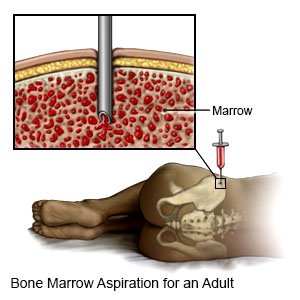Bone Biopsy
Medically reviewed by Drugs.com. Last updated on Apr 6, 2025.
What do I need to know about a bone biopsy?
A bone biopsy is a procedure to take a sample of bone tissue. It may be done with a needle or during surgery. A bone biopsy may be done to test for cancer, infection, or bone disease.
How do I prepare for a bone biopsy?
- You may need blood or urine tests before the procedure. Your healthcare provider will talk to you about how to prepare for the biopsy. You may be told not to eat or drink anything after midnight on the day of your biopsy. Your provider will tell you which medicines to take or not take on the day of your biopsy.
- You may be given an antibiotic through your IV to help prevent a bacterial infection. Contrast liquid may be used during the procedure to help the bone or tumor show up better in pictures. Tell your healthcare provider if you have an allergy to contrast liquid. You will need someone to drive you home after the biopsy.
Drugs used to treat this and similar conditions
Sandostatin
Sandostatin is used to treat acromegaly and to reduce flushing episodes and watery diarrhea caused ...
Sandostatin LAR Depot
Sandostatin LAR Depot is used for acromegaly, carcinoid tumor, vasoactive intestinal peptide tumor
Omvoh
Omvoh is used to treat moderate to severe ulcerative colitis or Crohn's disease in adults. This ...
Albenza
Albenza is used for ascariasis, capillariasis, cutaneous larva migrans, cysticercus cellulosae ...
Biltricide
Biltricide is used for beef tapeworm infection, cysticercus cellulosae, dog tapeworm infection ...
Bynfezia Pen
Bynfezia Pen (octreotide) is used to treat acromegaly and to reduce flushing episodes and watery ...
Albendazole
Albendazole systemic is used for ascariasis, capillariasis, cutaneous larva migrans, cysticercus ...
Praziquantel
Praziquantel systemic is used for beef tapeworm infection, cysticercus cellulosae, dog tapeworm ...
Octreotide
Octreotide systemic is used for acromegaly, carcinoid tumor, diabetes, type 1, diarrhea, dumping ...
Mebendazole
Mebendazole systemic is used for angiostrongylosis, ascariasis, capillariasis, dracunculiasis ...
What will happen during a bone biopsy?
- You may be given general anesthesia to keep you asleep and free from pain during the biopsy. You may get general anesthesia if your healthcare provider needs to make an incision to remove a larger piece of bone. You may instead be given local anesthesia with medicine to help you relax. With local anesthesia, you may still feel pressure or pushing during the biopsy, but you should not feel any pain. Your provider may use contrast liquid to help your bone show up better in pictures. The provider may use it in both types of bone biopsies.
- If a bone biopsy will be done with a needle, your provider will insert a needle through your skin and into your bone. A small amount of bone tissue will be removed through the needle. Your provider will take the needle out and hold pressure on the area for several minutes. A small bandage will be placed over the area to prevent infection.

- If your provider needs to remove a larger piece of bone, an incision will be made in your skin. Your provider may use a drill to remove a piece of your bone. Cement or a metal rod may be placed into your bone to prevent it from breaking. Your provider may close the incision with stitches or surgical tape and cover it with a bandage.
What will happen after a bone biopsy?
You will be monitored by healthcare providers until you are awake and your vital signs are stable. Your vital signs include your blood pressure, heart rate, and breathing. You may need an x-ray to look for breaks in your bone. You may go home after your procedure or may need to spend the night in the hospital.
What are the risks of a bone biopsy?
You may bleed more than expected. Your bone may become infected or weak. Your bone may break during or after the procedure. The needle may break and cause nerve or blood vessel damage. You may have swelling and pain.
Care Agreement
You have the right to help plan your care. Learn about your health condition and how it may be treated. Discuss treatment options with your healthcare providers to decide what care you want to receive. You always have the right to refuse treatment. The above information is an educational aid only. It is not intended as medical advice for individual conditions or treatments. Talk to your doctor, nurse or pharmacist before following any medical regimen to see if it is safe and effective for you.© Copyright Merative 2025 Information is for End User's use only and may not be sold, redistributed or otherwise used for commercial purposes.
Further information
Always consult your healthcare provider to ensure the information displayed on this page applies to your personal circumstances.
